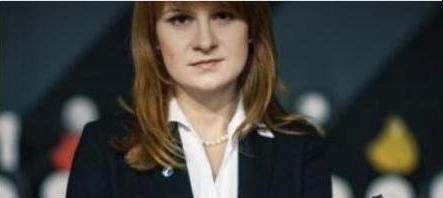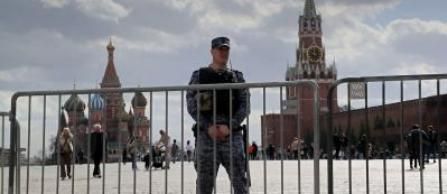By Eric Vandenbroeck and co-workers
An Opening for Russia to Shatter Western
Unity
President-elect Donald Trump’s stunning political comeback has created
an opening for Russia to shatter Western unity on Ukraine and redraw the global
power map, according to several influential members of the Russian elite.
Across the corridors
of power in Moscow, the win for Trump’s populist campaign arguing that America
should focus on its domestic woes over aiding countries like Ukraine was being
hailed as a potential victory for Russia’s efforts to carve out its own sphere
of influence in the world.
John
Mark Dougan, a retired sheriff’s deputy, reportedly created fake news sites
with funding from the Russian military.
In even broader
terms, it was seen as a victory for conservative, isolationist forces supported
by Russia against a liberal, Western-dominated global order setting the rules
for the entire world that the Kremlin (and its allies) have been seeking to
undermine.
“We have won,”
said Alexander Dugin who has
long pushed an imperialist agenda for Russia and supported disinformation efforts against Kamala
Harris’s campaign.“ … The world will be never ever like before. Globalists have
lost their final combat,” he wrote
on X.
The deputy speaker of
Russia’s upper house of parliament, Konstantin Kosachev,
said on his Telegram channel: “The victory of the right in the so-called ‘free
world’ will be a blow to the left-liberal forces that dominate it. It is not by
chance that Europe was so openly ‘rooting’ for Harris, who would, in fact,
preserve the rule of the Obama-Clinton ‘clan.’“
Konstantin Malofeyev, the Russian Orthodox billionaire who has funded
a conservative agenda promoting traditional Christian values on the far right
and far left across the West, crowed on Telegram that it would be possible to
negotiate with Trump, “both about the division of Europe and the division of
the world. After our victory on the battlefield.”
In more immediate
terms, Trump’s election victory was expected to have a
dramatic impact on Russia’s ongoing war in Ukraine, according to Leonid
Slutsky, the head of parliament’s foreign affairs committee.
“Judging by the
pre-election rhetoric … the Republican team is not going to send more and more
American taxpayer money into the furnace of the proxy war against Russia,” he
said. “Once the West stops propping up [Ukrainian President Volodymyr]
Zelensky’s neo-Nazi regime, its downfall will happen in a matter of months, if
not days.”
But others were more
circumspect, and some warned that Trump’s presidency could lead to a more
unpredictable era. Kremlin spokesman Dmitry Peskov said Russia would wait to
see if the president-elect’s campaign rhetoric, criticizing support for Ukraine
and calling for an end to the war, translated into “concrete actions.” He
declared that the United States remains “an unfriendly country that directly
and indirectly is involved in a war against our state.”
Russian lawmaker Maria Butina, who previously served 15 months in a
U.S. federal prison after being convicted of operating as an unregistered foreign agent in the United States, told
The Post this was “a good chance for U.S.-Russian relations to improve.” She
added, “Hopefully this time … Trump will keep his promise to truly be a
peacemaker.”

In the weeks leading
up to the election, Russian officials sought to downplay their interest in the vote, but that public stance
was belied by what U.S. officials said were intensifying Kremlin-directed
disinformation operations seeking to stoke chaos and target Harris. The
operations built on earlier efforts to stoke isolationist sentiments, according to documents previously reported on by The
Post.

In the end, Russian
efforts to interfere in the 2024 election were “pretty marginal to the overall
trend of voter sentiment,” said Eric Ciaramella, a former White House official
now at the Carnegie Endowment for International Peace, especially compared to
2016 when U.S. intelligence officials concluded that a Russian hack and leak
operation had helped change the narrative in support of Trump.
But analysts also
noted that more than a decade of Russian propaganda operations amplifying
anti-establishment isolationist voices through increasingly sophisticated social media operations,
including on X, changed the mainstream political debate in a way that would
never have been possible via traditional media.
“On a digital
platform, your ability to do these things works,” said Clint Watts, the head of
Microsoft’s Threat Analysis Center. Following the vote, X/Twitter owner Elon Musk hailed the result as cementing the power
of his platform to provide alternative views over “legacy media.”
Russia’s business
community could also not hide a new sense of optimism that Trump’s victory
would change things for the better in the Russian view.
Shares on the Moscow
stock exchange surged nearly 3 percent in early trading as the election results
came in, amid widespread expectations that Trump could propose lifting
sanctions against Russia in return for an end to its military action.
“Trump is someone who
is used to doing deals,” said one Moscow businessman, speaking on the condition
of anonymity for fear of retribution. “The expectation is that under Trump,
decisions will be reached faster to end the conflict and ease sanctions.”
For updates click hompage here